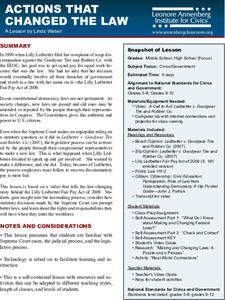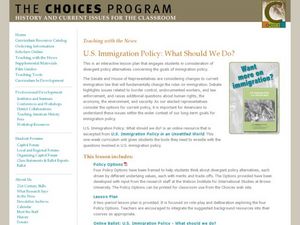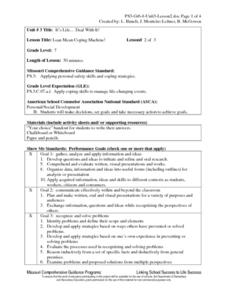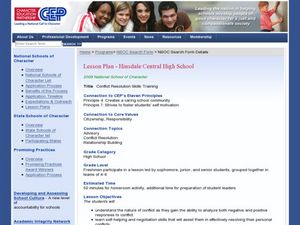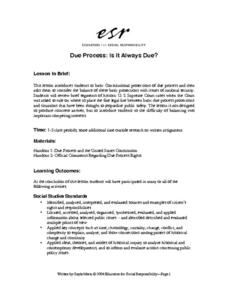Annenberg Foundation
Actions that Changed the Law
The Fair Play Act of 2009 came about due to the actions of one woman. Young historians research Lilly Ledbetter and what she went through to get pay equal to that paid to men for the same work at Goodyear Tire and Rubber Company. The...
Kids Voting USA
Kids Voting USA: K-2 Classroom Activities
Address both social studies and critical reading skills with a resource dedicated to the voting process, the American democracy, and the ability to evaluate information in order to develop a stance on an issue. Each themed activity...
City University of New York
Electoral College
A presidential election is a lot like the 2004 World Series, and it's also a lot like choosing an orange in a paper bag. Apply the process of the electoral college to these two analogies with a set of lessons about government...
Federal Reserve Bank
Income Taxes
Most adults dread April 15 — tax day! Tax preparation can be intimidating even for adults. Build confidence by leading individuals through the process and then give them a scenario to practice. The exercise uses tax vocabulary to give...
Curated OER
US Immigration Policy: What Should We Do?
High schoolers evaluate immigration policies. In this global issues lesson, students analyze the long-term goals of divergent immigration policies as they role play the deliberation process.
National Constitution Center
Town Hall Wall: College Exam
The college that directly affects young citizens' lives is not the university they're applying to. Learn about the Electoral College in a town hall activity in which class members debate the merits of the current system versus electing a...
DocsTeach
Exploring America's Diversity: Luther Powell (Beginner)
Luther Powell immigrated to the United States to live the American dream—and create a better life for his son, four-star general Colin Powell. Elementary academics look at documents, such as, ship records to understand the immigration...
Curated OER
ONE VOTE
In order to understand the political process and the importance of voting, pupils will construct a class time line. They will group up and research a specific era, creating a time line of political events where one vote made a...
Mikva Challenge
The Great Electoral Race Kickoff
Do young people care about elections? Host a discussion about the role of young citizens in the electoral process with an engaging social studies lesson plan. As high schoolers read and respond to four statements about youth...
American Institute of Architects
Architecture: It's Elementary!—Fifth Grade
Young citizens construct an understanding of urban planning in this cross-curricular unit. Covering every aspect of city development from the political, economic, and social influences to sustainable building practices, this...
Advocates for Human Rights
All about Me!
Celebrate the uniqueness of your students with this character building lesson series. In order to learn about and appreciate diversity and individuality, children create All About Me books by cutting out and drawing pictures...
DC Vote
One Kid, One Vote
Learn about why the citizens of Washington, D.C. feel unrepresented in Congress with an article about D.C voting rights. Individuals read about the movement toward congressional representation in Washington, D.C., before...
Curated OER
To Vote or Not to Vote? that is the Question!
Students examine voting rights provided by the United States Constitution. In this voting activity, students focus on 3 amendments that extended voting rights to all citizens. Students discuss the importance of expressing opinions...
Curated OER
An Introduction to Immigration and the Canadian Political System
Twelfth graders take a citizenship test before learning how their own ideology fits in with current political parties. They create questions for a debate and learn the process of registering to vote.
Curated OER
Voting and US Resident Aliens
Twelfth graders examine the process of voting. In this American Government lesson, 12th graders evaluate the arguments for and against alien voting. Students participate in a debate on voting rights.
Curated OER
Communism
Sixth graders study how Russian government has changed and how the attitudes of people have changed as a result of these political changes, while learning how to write a persuasive paper, type paragraphs, and use WP utilities.
Curated OER
Roe v. Wade: A History of Controversy
Young scholars research what is legal now as far as abortions are concerned. Does it matter what state you live in? Does it matter how old you are? If you are a teen, does the doctor have to notify your parents? Students prepare a panel...
Curated OER
Cutting Down Trees
Students research what kind of problems force a city or town to decide to remove trees. Students research what controversy has occurred in other cities or towns. Students interview those responsible for such decisions in your city or...
Curated OER
The Economics of Voting
Students examine the voting behavior of people during a presidential election to determine costs and the benefits of voting and how this behavior is influenced by incentives.
Curated OER
Lean Mean Coping Machine!
Seventh graders apply coping skills to manage life-changing events. They plan and make written, oral and visual presentations for a variety of purposes and audiences, and then exchange information, questions and ideas while recognizing...
Curated OER
Conflict Resolution Skills Training
Students complete conflict resolution skills training as a part of creating a caring school community. For this conflict resolution lesson, students work with a group of peer student leaders to resolve conflicts. Students visit freshman...
Curated OER
Representation of the Common Citizen From Declaration of Independence to Present
Students create working definition of common citizen, and investigate and discuss important sections of Declaration of Independence, Articles of Confederation, U.S. Constitution, Bill of Rights, and other Amendments. Students demonstrate...
Curated OER
Due Process: Is It Always Due?
Students explore the basic Constitutional protections of due process and then consider the balance of these basic protections with issues of national security. A variety of segments of U.S. Supreme Court cases are examined in this lesson.
Curated OER
Academic Raceway 500
In this community government PowerPoint, students participate in a game with a race track format in which they answer questions about local government, the election process, and the decision making process used in a democracy.
